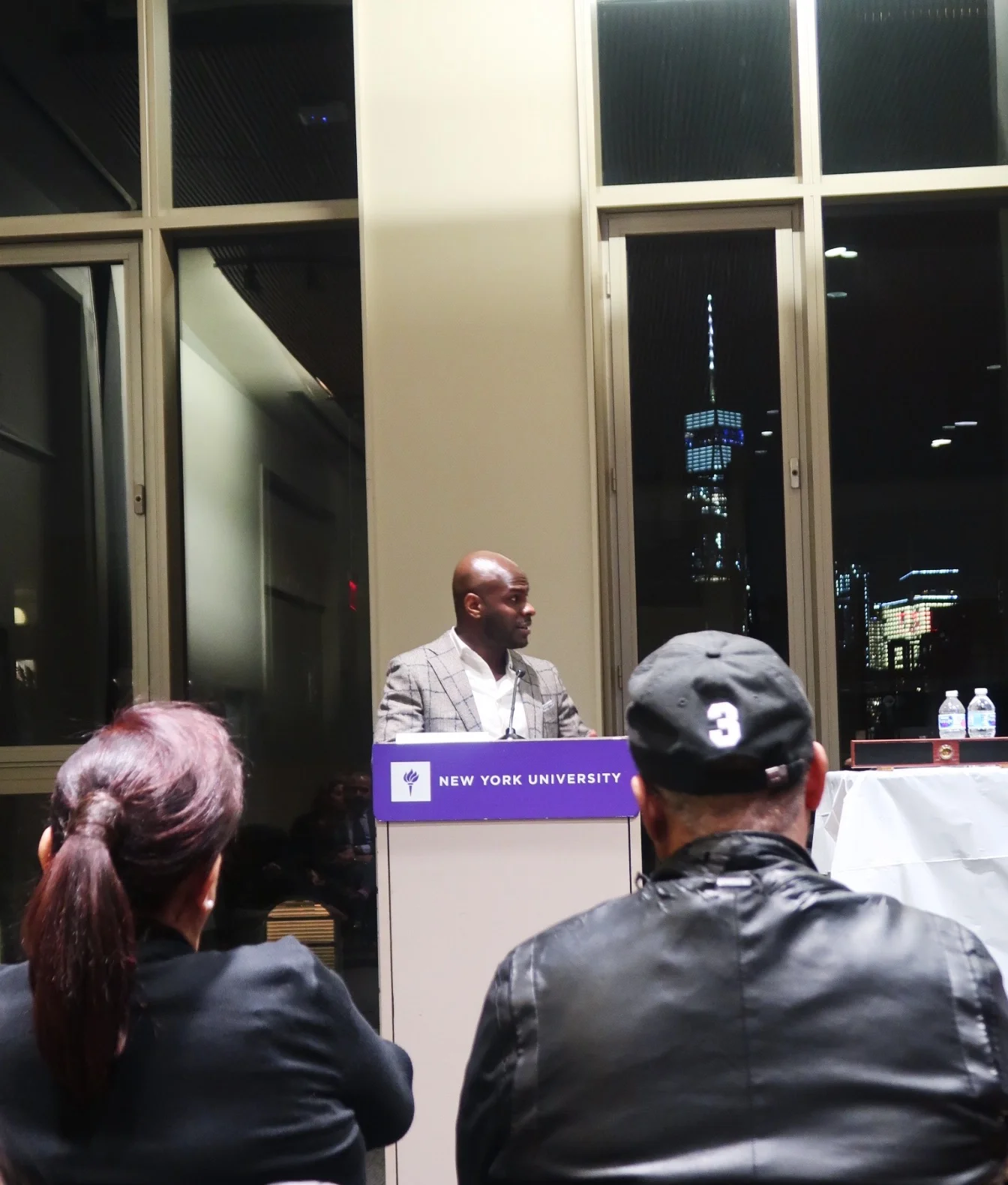Beyond Black and White
Más Allá de Blanco y Negro
by Carmen Rita Candelario
I wish I could properly express how excited I am every time I attend events like the one hosted by LSWSO at NYU Silver, titled ‘Beyond Black and White: Conceptualizing Afro-Latinidad in Practice for the 21st Century’, Contrary to what many prefer, I like when I do not feel like the smartest person in the room, and this past year, as I attend more and more events created and hosted by the Dominican diaspora and people of color, I have understood just how much I still need to learn. And I find this exciting and fascinating.
Last Tuesday, February 27th, I joined a group of eager attendees to listen to a panel of only women of color, moderated by an award-winning journalist and fellow Dominican Claudio E. Cabrera, who currently works at the New York Times as a Senior Digital Strategist. The panel consisted of four remarkable women, with careers and trajectories so important that I want to make sure you get a good idea of each of them:
Dra. Rosa N. Lavergne
Well known in Washington Heights, Dra. Rosa is a bilingual health counselor with over 30 years of experience. She has dedicated her adult life to helping people understand the active role they must have in their own wellbeing. She is also the co-founder of a place we love, The Dominican Women’s Development Center.
Janel Martinez
Entrepreneur and multimedia journalist, Janel is the founder of the award-winning blog Aint I Latina? - an online destination celebrating Afro-Latinas. She is also the co-founder of 2020Shift, and a frequent public speaker.
Karina Aybar-Jacobs
This fiery Dominican woman is a counselor, activist and outspoken public speaker, who has served as the Program Director at Nuevo Amanecer. She is passionate about “raising consciousness and promoting action” around the issues of women’s rights, especially of women of color.
Stephanie Lorenzo
First generation Afro-Dominican-American, Stephanie is a Licensed Master Social Worker currently working in the Bronx, where she grew up. With degrees from the University of Rochester and NYU, Stephanie currently works Northside Center for Child Development on their school-based outpatient mental health program.
The fantastic purpose of this panel was to “address the ways in which individuals of Latinx/Hispanic heritage navigate society and social work practice”, especially since for Latinx community “issues of racism, colorism, and anti-Blackness are nuanced and uniquely distinct from Black and other non-Black communities.”
As you can imagine, the topic and questions were incredibly hard and loaded, so much so that the duration of the event did not even begin to scrape the surface of the many terminologies and practices we need to both learn and unlearn in order to understand how we can best approach race and ethnicity, and how we as people and, in the case of a lot of the audience, social workers as well, can help dismantle white supremacy and racism in our community. Among my favorite quotes were ‘Afro-Latinidad is not a trend’ (by Janel), and the important response Karina gave me when I asked how can we, light-skinned Latinas, help: “Do not patronize. Allow the sisters to speak for themselves. Give them the platforms to tell their stories.”
I personally cannot wait for the next time an event happens around conversations like the ones had this day, and I hope that reading about these opportunities encourages you to both attend and organize your own panels and conversations around the topics of race, ethnicity, and racism in our communities. Creating change does not require posters or protest every time. Even a group chat can create profound changes, don’t forget that.
Ojalá pudiera expresar adecuadamente lo emocionante que es para mi asistir a eventos como el organizado por LSWSO en NYU Silver titulado 'Más allá de Blanco y Negro: Conceptualización de la Afro-Latinidad en la Práctica para el Siglo XXI'. Al contrario de lo que muchos prefieren, a mi me gusta cuando no me siento la persona más inteligente del salón, y durante este último año, a medida que asisto a más y más eventos creados y organizados por la diáspora Dominicana y gente de color, he entendido cuánto me queda por aprender, lo cual me parece fascinante.
El pasado Martes 27 de Febrero, me uní a un grupo invitados entusiasmados por escuchar un panel de sólo mujeres de color, moderado por un galardonado periodista y compañero Dominicano Claudio E. Cabrera, quien actualmente trabaja en el New York Times como Estratega Digital. El panel consistió de cuatro mujeres notables, cuyas carreras y trayectorias son tan importantes que quiero asegurarme de que tengas una buena idea de cada una de ellas:
Dra. Rosa N. Lavergne
Bien conocida en Washington Heights, Dra. Rosa es una terapeuta bilingüe con más de 30 años de experiencia. Ella ha dedicado su vida adulta a ayudar a las personas a comprender el papel activo que deben tener en su propio bienestar. Es también cofundadora de un lugar que amamos, el Centro de Desarrollo de Mujeres Dominicanas.
Janel Martinez
Empresaria y periodista multimedia, Janel es la fundadora del galardonado blog Ain’t I Latina? - un destino online que celebra a las Afro-Latinas. Es también co-fundadora de 2020Shift, y frecuentemente actúa como oradora pública.
Karina Aybar-Jacobs
Esta imponente mujer dominicana es primero que nada una consejera y activista que en el pasado se desempeñó como Directora del programa en Nuevo Amanecer. Karina también es oradora pública, apasionada por "elevar la conciencia y promover la acción" en torno a los temas de los derechos de las mujeres, especialmente de las mujeres de color.
Stephanie Lorenzo
Afro-dominicana-estadounidense de primera generación, Stephanie es una trabajadora social actualmente trabajando en el Bronx, donde creció. Con títulos de la Universidad de Rochester y NYU, Stephanie actualmente trabaja en el Northside Center for Child Development en su programa de salud mental para pacientes ambulatorios basado en la escuela.
El propósito de este panel fue "abordar las formas en que las personas de herencia Latina / Hispana navegan por la sociedad y la práctica del trabajo social", especialmente porque para la comunidad Latinx "los temas de racismo, colorismo y anti-negro son matizados y singularmente distintos que otras comunidades negras".
Como te puedes imaginar, el tema y las preguntas fueron increíblemente difíciles y cargados, tanto así que la duración del evento ni siquiera comenzó a tocar la superficie de las muchas terminologías y prácticas que necesitamos aprender y desaprender para comprender cómo podemos abordar mejor el concepto de la raza y la etnicidad, y cómo podemos como personas y, en el caso de una gran parte de la audiencia, también como trabajadores sociales, ayudar a desmantelar la supremacía blanca y el racismo en nuestra comunidad. Entre mis citas favoritas estaba “Afro-Latinidad no es una tendencia'” (por Janel) y la importante respuesta que Karina me dió cuando le pregunté cómo podemos ayudar las latinas de piel clara: "Cero condescendencia. Permite que las hermanas hablen por sí mismas. Dales las plataformas para contar sus historias."
Personalmente, no puedo esperar la próxima vez que ocurra un evento en torno a conversaciones como las que tuve este día, y espero que leer sobre estas oportunidades te aliente a asistir y a organizar tus propios paneles y conversaciones sobre los temas de raza, etnicidad y racismo en nuestras comunidades. Crear cambios no siempre requiere carteles ni protestas. Incluso un grupo en WhatsApp puede generar cambios profundos. No olvides eso.





